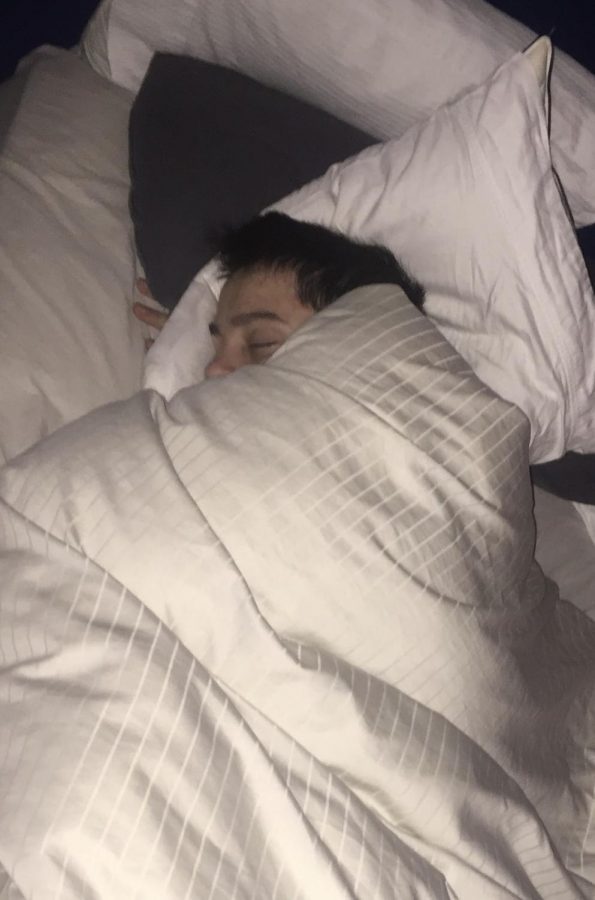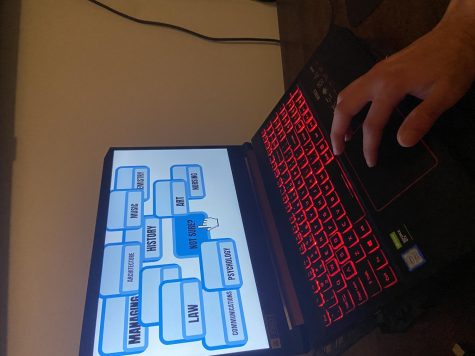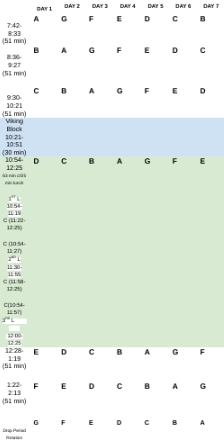The inside scoop on our Tritonians’ mornings
Shane Rooney at 7:15 AM

Listen to a Podcast of this article by clicking the Image
Are you the early bird up and ready to go at 5 in the morning? Or, are you the late bird scrambling to get out the door with both shoes on, ten minutes before the bell rings?
Imagine a typical morning routine filled with a nice breakfast, a hot shower, and time to enjoy some coffee. Now, imagine waking up after hitting the snooze one too many times, realizing that your stay in bed lasted 10 minutes longer than it should’ve. It’s likely that both of these events have happened amongst our school’s student body before. A number of Tritonians thrive in these scenarios, making the most of their morning routines, or oppositely, pursuing the least of them.
“[I go to bed at] like 11:45,” says Junior Andrew Maiuri, “so how long is that, like eight hours?” About seven hours, actually, if you’re waking up around 7 AM, but that is close to a normal amount of sleep for the average high school student. The driving force behind most morning routines is sleep deprivation.
According to nationwidechildrens.org, adolescents are notorious for not getting enough sleep. The average amount of sleep that teenagers get is roughly seven hours. However, they say that teens need nine to nine ½ hours. The website explains that teenagers do not get enough sleep for a number of reasons, those including shifts in sleep schedules, early high school start times, and school obligations.
Similarly, senior Shane Rooney wakes up late for his routine due to this reason. “[I feel] so sh****, I just want to go to bed.” Says Rooney. “[I can tell you] my least favorite part: waking up. It sucks, I hate the morning.”
The little amount of sleep Rooney gets is clearly reflected in his mood. Fatigue and crankiness are both common side effects of sleep deprivation. Many Triton students are familiar with these early morning feelings. “I usually wake up between 6:30 and 7:10… 7:15 maybe,” says Rooney. “The first thing I do is look at my phone.”
Scrolling through a cell phone is a common morning activity amongst high school students. “3 Awful Morning Routines that Keep People Average,” an article by Cayla Vidmar on medium.com, specifically talks about the effects a phone has on the morning routine, as well as a student’s mood throughout the day. She explains that starting your morning by scrolling through social media exposes yourself to a number of people’s opinions and agendas, which without knowing, triggers emotional reactions as well as an ego. “When your ego gets going, uninhibited, it ends up writing the script for how your day and your reactions are going to go,” says the author.
Waking up late for school can have other negative effects on teens. Both Maiuri and Rooney, like a number of other teenagers, say they don’t have time in the morning for breakfast, skipping what is referred to as the most important meal of the day.. Skipping morning meals is known to increase risks of heart disease, low energy levels, weight gain, disrupted cognitive functioning, and more. Breakfast provides nutrients that teens need to get through a morning efficiently, and spending the first half of a school day on an empty stomach is detrimental to their health.
On the other end of the spectrum, junior Bridget Tucker is the face of a more productive, profitable morning. “So I used to sleep in really late, but then I told myself: Junior year is gonna be the year that I’m on my grind. So, every morning I set an alarm for around 5:45 to 6:15 and then I wake up. I get dressed, I do my makeup, I eat food, then I brush my teeth,” says a motivated Tucker.
“If I have some time, I like to go for a 10 minute jog to wake myself up because I don’t do caffeine. Then I do any extra homework I have to do before my dad decides to drive me to school.”
Tucker, like a few other Tritonians, takes advantage of an early morning, and is said to be determined to make the most out of it. Having an organized morning routine has many long term advantages. It teaches self-discipline, which is associated with the simple act of waking up early and getting out of bed. It teaches proper time management as well, allowing you to apply these skills to other time-dependent activities in everyday life. Lastly, and arguably most important to high school students, pursuing an uncluttered, unrushed morning routine helps prevent stress. Stress is confirmed to be a roadblock for every high school student, and a stressful morning has the ability to be the frosting on the cupcake for any busy school day.
After reading this, it may be time to consider making some broad changes in your morning routine.

My name's Sophia Agrella and I'm a junior at Triton High School. I enjoy covering interesting new stories that people want to hear. I'm a certified nursing...

Jeremy Duford, senior at Triton, decided to join journalism to report on all the various drama and news he's felt enveloped in over the past three years....










